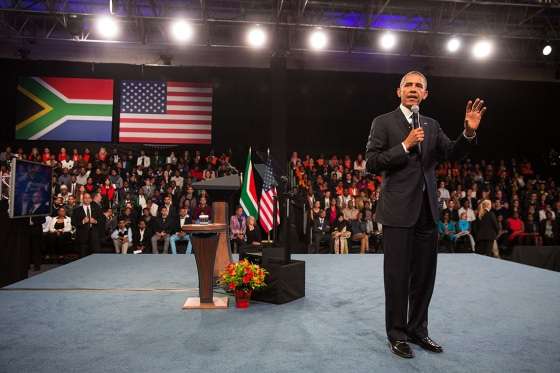Obama's Climate Worries About Africans Getting Cars, Air Conditioners, and Modern Houses

On June 29, after President Barack Obama made some remarks in Johannesburg in South Africa to a group of young African leaders, he was asked by Sydney Mukumu (ph) about U.S. foreign policy with regard to the environment. The president understood the question as referring to U.S. positions on the problem of man-made climate change. The president responded:
The biggest challenge we have environmentally -- and it is an international challenge that we cannot solve alone -- is the issue of climate change….
The United States actually reduced our carbon emissions more than any other country since I came into office. I just want to make that point. (Applause.) We doubled fuel-efficiency standards on cars. We're investing in clean energy like solar and wind. And we actually want to share that technology, because we think that all countries need to benefit. And part of the opportunity for Africa is to see if we can leapfrog some of the polluting practices of America or Europe, and go straight to the clean energy strategies that will allow you to advance economic growth, but not corrupt the planet….
We're going to all have to work together to find ways in which collectively, we reduce carbon but we make sure that there's some differentiation so that countries that are very wealthy are expected to do more, and countries that are still developing, obviously they shouldn't be resigned to poverty simply because the West and Europe and America got there first. That wouldn't be fair. But everybody is going to have to do something. Everybody is going to have to make some important choices here. And I expect that it's going to be your generation that helps lead this, because if we don't, it's going to be your generation that suffers the most.
Ultimately, if you think about all the youth that everybody has mentioned here in Africa, if everybody is raising living standards to the point where everybody has got a car and everybody has got air conditioning, and everybody has got a big house, well, the planet will boil over -- unless we find new ways of producing energy.
Later in Tanzania, President Obama announced a $7 billion initiative to supply more electricity to impoverished Africans. Around 580 million people living in subSaharan Africa are not connected to any electricity supply. To provide basic acess to electricity to everyone in subSaharan Africa the Washington Post reports:
As for Africa itself, this technical paper in the journal Utilities Policy estimated that Africa would need a tenfold increase in installation capacity to bring everyone basic power by 2030. To get all of sub-Saharan Africa up to South African levels, for instance, would require 330 gigawatts of new capacity. For context, the White House announcement would bring about 10 gigawatts.
The Post notes that the president's iniitiative has lined up some private sector power projects including one from Husk Power Systems. Based in India, Husk Power aims to will install 200 "decentralized biomass-based mini power plants" in Tanzania. Interestingly, Husk Power notes that the operational costs of one of its mini power plants is about 15 cents per kilowatt-hour.
As the Post reports, the government of Tanzania is interested in exploiting offshore natural gas deposits as a way to produce electric power. The U.S. Energy Information Administration calculates that natural gas fired electricity will cost about 7 cents per kilowatt-hour in 2018.
However, with a score of 35 out of 100 Tanzania ranks 102 out 176 on Transparency International's Corruption Perception Index. It may well be the case that the costs of corruption are so high that Husk Power - at twice the price of conventional natural gas - would ultimately be cheaper to supply. Husk Power Systems deserves praise for devising a way to provide electricity to truly impoverished people despite their corrupt and inept governments.
Finally, the president's African greenhouse gas worries about Africa are overblown. The Post quotes Tom Hart, the executive director of the ONE Campaign:
"If you provided 580 million Africans with basic energy access, that would increase global carbon emissions by just 1 percent." In other words, if Obama wants to tackle global warming, Africa certainly isn't the place to start.
If the president really wants to help Africans cope with a warming planet, he would forthrightly tell their governments to stop stealing from their citizens, adopt the rule of law, and open their markets to free trade, so that they could create the wealth needed for climate resilience.


Show Comments (88)